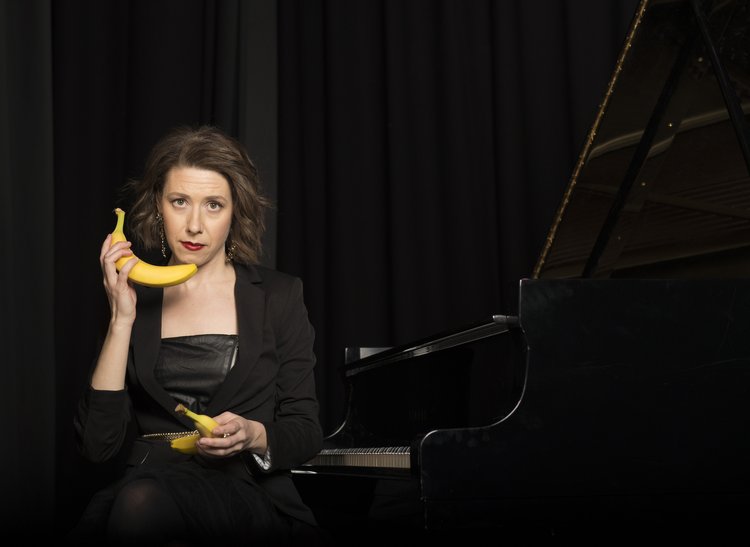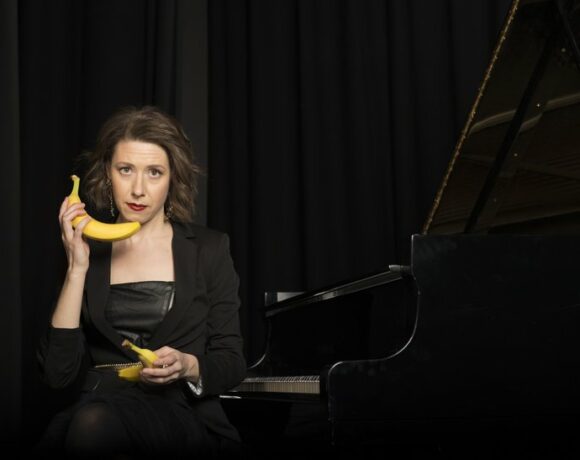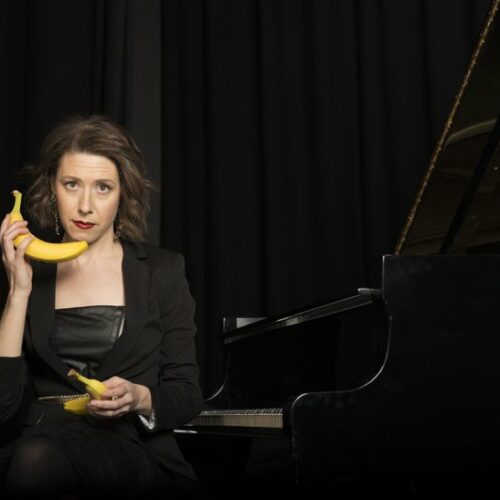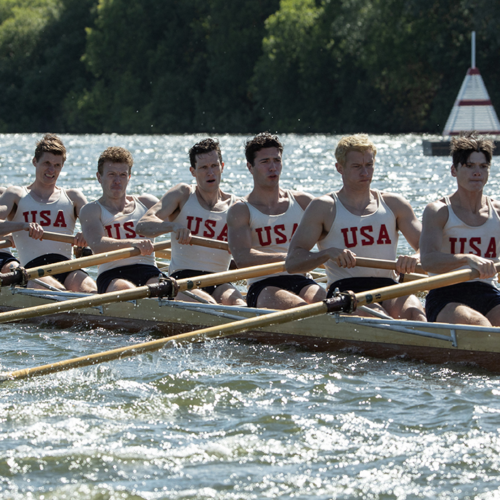
An interview with pianist and comedian Sarah Hagen

LISTEN
Classical music can have a reputation of being all too serious. But not in the hands of Sarah Hagen. Part piano recital, part comedy sketch, Hagen’s show, “Perk Up Pianist!” pairs anecdotes and stories with pieces by Chopin, Debussy, and Liszt. NWPB’s Steve Reeder spoke with Hagen about her show, and her different kind of performance style.
Extended Interview Highlights
On her early inspirations.
I had two big influences growing up, one which seems kind of unlikely, but a big inspiration for me was Florence Foster Jenkins. I think I was able to get on stage at all because of her because she was so brave. You know, even if her singing wasn’t very good. She just did. She just wanted to be on stage, so she did it. And the other big influence for me was Victor Borge. I grew up watching his videos, and I just thought that that was magic, that he could bring audiences into the music in a totally different way. I think it really only worked because he played so well. Otherwise, it would have fallen flat.
On demystifying Classical music.
It’s weird. People talk about music and then they talk about Classical music, and I don’t know why it’s so separate. For me, all music is the same. It’s all part of the same form. And another thing that I do that’s maybe a little bit unlikely is. I’ve taken to playing at big outdoor folk festivals in the summer time. I just kind of thought, well, what if I pretended this was folk music? How would that make it different? And audiences love it because people are just so willing and ready to listen. And people also, you know, folk music is really about the story as much as about the song. And I feel like that’s true for classical music, or it is for me anyway, that the story is so much a part of how we get to live in the music. And I think it’s really helpful to know how the music came to be because that helps us as listeners to find our own story and to feel the connection with the composer as well.
On cultivating a different kind of piano performance style.
I think at the core of it all is that being on stage is really about communicating. So, for me, actually playing the pieces or talking about the pieces, those are interconnected for me. I mean, it’s not really about giving a history lesson, it’s just about inviting people into the music. I think I’m just always getting better at that. I don’t want to stay at one level ever. I think I do all these different projects because I’m always just trying to live a richer life.
On her childhood and her discovery of music and piano as her medium of expression.
I grew up on the West Coast on Vancouver Island. I’m the youngest of five children, and my parents had two rules: we had to learn how to swim and we had to learn how to play piano. So, that’s how I got my start. Apparently, I was really asking for the lessons, so I got to start before my brother who is older than me. And I think it was just kind of “game over” from the first lesson. I just really loved it so much. And I think you know, when you grow up in a busy house like that, there’s something about the piano or you’re just kind of in your own space and can block out all the din around you.
On her “Wonder Women” recital, and her favorite women composers.
Yeah, I’m actually right now on a Cecile Chaminade kick. She was actually wildly popular in her time and has been largely forgotten. She wrote well over 150 piano pieces, and they’re all so wonderful and imaginative, and each one has its own flavor. So, I’m very big on bringing her music to life. And another composer is Marianna Martinez, who lived in the same circles as Mozart and Haydn. She even lived in the same house as Haydn for a while. And she devoted her life to music so she didn’t marry. She hosted these wonderful gatherings where all of the musicians in Vienna got together and shared what they were writing and working on and thinking about. She was such an important part of the cultural fabric of Vienna. I really love to highlight her music and her story.
I played this program a couple of years ago in Toronto, and the reaction from the audience was not what I expected. I had many people come up to me and tell them that the program made them feel very sad, because they realized how much had been lost. You don’t really want your audience to feel sad, of course, but it was such an interesting reaction. I didn’t expect that this sadness.
On her acclaimed recording of Bach’s Goldberg Variations, and the legacy of Glenn Gould.
I mean, Canadians are a little bit fanatical about the Goldberg Variations because we love Glenn Gould so much. And, of course, I never got to meet him, but I grew up with the recordings as many Canadians did. And I can’t say they influenced my own interpretation, but they’re definitely fascinating. You can’t escape the connection. I was talking to a friend, and I said, you know, people often forget that Bach wrote the Goldberg Variations. Gould didn’t write them. And he said, “Well, I worked with Gould in the 80’s and by the end, Gould actually probably thought he did write the Goldberg Variations.”
I actually think it has been very freeing for all pianists. I often tell young students, there really aren’t rules especially with Bach. It’s a fresh slate. So, you can approach it in so many ways. And I just think that Gould really helped us to all feel even more free with the music.
Related Stories:

Reeder’s Movie Reviews: Deadpool & Wolverine
Disney/Marvel Read “I don’t know anything about saving worlds, but you do.” -Deadpool addressing Wolverine The meta has overtaken the Marvel Cinematic Universe (MCU). After a six-year period marked by

An interview with pianist and comedian Sarah Hagen
Classical music can have a reputation of being all too serious. But not in the hands of Sarah Hagen. Part piano recital, part comedy show, “Perk Up Pianist!” pairs anecdotes and stories with pieces by Chopin, Debussy, and Liszt. NWPB’s Steve Reeder spoke with Hagen.

Reeder’s Movie Reviews: The Boys in the Boat
Courtesy of MGM Studios/Boys inthe Boat. Read When a group of scrappy have-nots apply an all-out, can-do attitude to a seemingly impossible task, they can sometimes make history. In fact,















